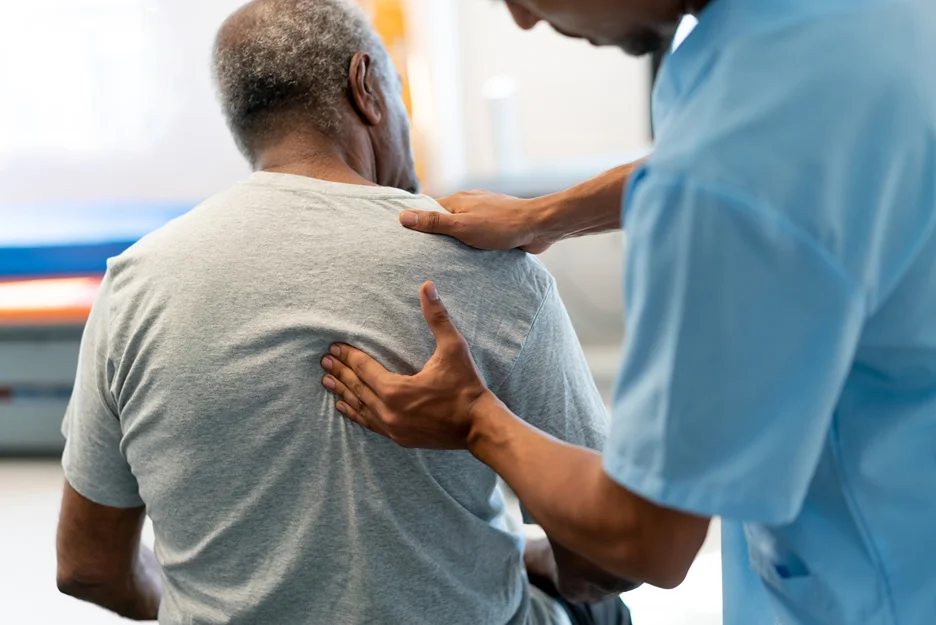If you’re experiencing persistent upper back pain, it’s only natural for some worry to creep in. Could this pain signal something more serious like cancer? Upper back pain can disrupt your daily life and routine, while also raising anxiety about the cause.
The good news is that in most cases, upper back pain is not associated with cancer. Muscle strain, poor posture, arthritis, trauma or even stress can lead to pain in this area. However, new, unexplained and consistent upper back pain should not be ignored.
When to Worry About Upper Back Pain – A Guide
That’s why our team of back pain experts want to empower you with the knowledge to take control of your health. In this comprehensive guide, we’ll walk you through:
- The most common causes of upper back pain and when to seek medical advice
- The potential link between upper back pain and certain types of cancer
- When upper back pain may be a symptom of something more serious
- Actionable steps you can take to find relief and get answers
Arm yourself with the facts. Our guide will clearly explain what’s considered normal vs abnormal upper back pain, how doctors evaluate these symptoms, and what you can do to manage the discomfort.
While cancer is a rare cause, we know that unexplained pain can cause unease. Our goal is to ease your worries so you can focus on finding solutions.
Here at Kaly, we believe knowledge is power – especially when it comes to your health. As your partner in back pain management, we want to provide you with trusted, expert-backed information. That way you can confidently discuss any concerns with your doctor.
When is upper back pain cancer?
We all feel some aches and pains as we age, but how can you tell if upper back pain is just part of growing older or a sign of a more serious issue? Upper back pain is considered worrisome and possibly cancer-related when it:
- Persists and worsens over time instead of going away
- Is more noticeable at night, disrupting sleep
- Is not relieved by rest
- Causes weakness, numbness or tingling in the arms or upper body
- Is accompanied by unexplained weight loss
Certain cancers are more prone to spreading to the bones and nerves of the upper back, leading to pain. According to studies, these include:
- Lung Cancer: Research indicates that 24-49% of lung cancer patients experience back pain at some point. Tumors can press on spinal nerves or spread to the vertebrae and ribs.
- Breast Cancer: Studies show that a number of women with metastatic breast cancer report severe back pain. Cancer cells from a breast tumor can metastasize to the spine and surrounding bone.
- Spinal Cancer: Cancers originating in the spine like myelomas can eat away vertebrae and discs leading to collapse, fractures, pinched nerves and pain.
- Pancreatic Cancer: Autopsies reveal that a number of people who died from pancreatic cancer had spine metastases that could cause upper back pain.
- Prostate Cancer: Advanced prostate cancer spreads to the lumbar spine in 40% of patients, potentially impinging on nerves and causing upper back pain.
So if you have persistent, worsening upper back pain, discuss your full history with your doctor. Targeted testing may be warranted to look for one of these cancers. Catching it early could save your life.
Does lung cancer cause upper back pain?

Lung cancer is one of the most common causes of cancer-related back pain, second only to breast cancer. As mentioned above, several studies have reported that a significant number of lung cancer patients experience upper back pain at some point during their cancer journey.
There are a couple reasons lung cancer may lead to upper back pain:
- Referred Pain: Lung tumors can press on the lining of the lungs and irritate nerves that run from the upper back to the chest. Though the tumor itself doesn’t spread, you may feel pain in the area of the nerves, known as referred pain.
- Metastasis: Lung cancer has a tendency to spread to bones. Research shows vertebrae in the upper back are the third most common site of bone metastasis after the pelvis and thigh bone. As cancer cells infiltrate the bones, they can weaken and even fracture them, putting pressure on nearby nerves and causing upper back pain.
Those living with lung cancer report the upper back pain feeling like a dull, deep ache ranging from annoying to debilitating. Some describe a burning sensation between the shoulder blades. Coughing or taking deep breaths can make it exponentially worse.
If you have a history of heavy smoking along with persistent upper back pain, discuss screening options with your doctor even if you have no other symptoms. Early detection could make treatment more effective.
Can upper back pain be a sign of breast cancer?
Upper back pain affects a majority of women with advanced breast cancer, particularly in cases that have metastasized and spread to the spine and ribs.
Breast cancer cells can break away from the original tumor and travel through the bloodstream to vertebrae or ribs. As these secondary tumors grow in the bone, they can cause pain by:
- Putting pressure on nearby spinal nerves
- Weakening bones and even causing fractures that are painful
- Releasing substances that stimulate nerves causing discomfort
Any new, persistent upper back pain warrants a trip to the doctor for a breast exam. Be sure to mention if you have any other changes like nipple discharge or lumps you can feel.
Breast cancer that has metastasized to the bone can be treated. But catching it early is key – survival rates are higher if it is caught when localized versus when it has already progressed.
Take Action: Get the Answers You Need

Don’t live with nagging “what-ifs” about your upper back pain. Download our guide today and take control of your health, one step at a time. We’re here to support you every step of the way to a pain-free life!
In addition to educational resources, Kaly can help connect you to a network of doctors and pain management providers. Our community is dedicated to ensuring you get the answers and treatment you need.
